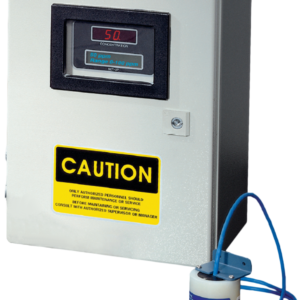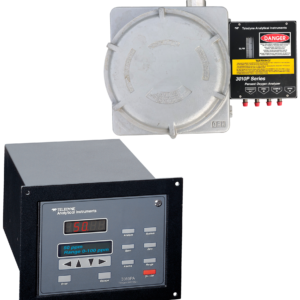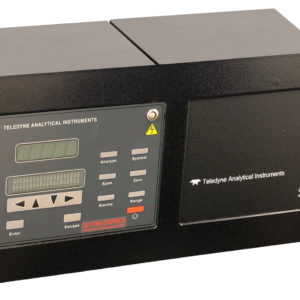Teledyne’s Model 3010MA Paramagnetic Percent Oxygen Analyzer is a versatile, microprocessor-based instrument specifically designed for oxygen purity analysis. Drawing on the solid performance of Teledyne’s 3000 Series control platform, the 3010MA provides the user with a wide variety of features while maintaining cost effectiveness.
- Brand
- DETAILS
- FEATURES
- SPECIFICATION
DETAILS
Principle of Measurement
The physical property distinguishing oxygen from other gases is its paramagnetism which is significantly greater than that of other common gases. Consequently, the molecules of oxygen are attracted by strong magnetic fields, a phenomena which can be used for detection purposes. A paramagnetic sensor consists of two spheres arranged in the form of a dumbbell suspended in a symmetrical, non-uniform magnetic field.
When the surrounding gas contains oxygen, the dumbbell spheres rotate out of the magnetic field by the relatively strong attraction of oxygen. A light beam focused on a mirror attached to the dumbbell reflects asymmetrically onto two photo diodes resulting in a voltage shift. The voltage difference produces a current used to drive the dumbbells back to the original position. The current flow required to maintain the null position is directly proportional to the oxygen concentration and is shown linearly in volume percent oxygen in the display. Properly maintained paramagnetic sensors last for years with little or no upkeep.
Advantages
Stability Built-in
Paramagnetic sensors, operating under suppressed, high-purity conditions, are natively subject to swings in their output based on changes in the surrounding barometric pressure. To properly compensate for such atmospheric pressure changes, Teledyne has incorporated an absolute pressure sensor in our system design.
In addition, to ensure an enhanced, stable performance, Teledyne maintains the paramagnetic sensor in its own isolated, heated compartment. A PID controller is used to properly control and maintain the temperature within the sensor compartment to optimize the analysis. The analysis section is mounted directly beside the 3010MA control unit allowing for a panel-saving, single 19″ rack mount configuration.
Flexibility
The 3010MA offers three dynamic, user-configurable ranges plus auto-ranging. The instrument is linear on all three ranges, eliminating the need to recalibrate while switching between ranges. The analyzer comes standard with an isolated 4-20 mADC output for oxygen concentration and range identification (optional). Additionally, a bi-directional RS-232C serial communication interface provides for remote monitoring and control of span and zero functions. Teledyne provides auto-calibration capabilities as a standard feature in the 3000 series platform.
Additional Advantages
- Linearity of analysis across three user-selectable ranges
- Temperature controlled/isolated sensor for long term stability
- Atmospheric Pressure Compensation for high-end, accurate performance
- Auto-ranging to follow process upsets
- Auto-calibration electronics standard
- Exceptional value at a favorable price
FEATURES
- Advanced paramagnetic sensor with barometric pressure compensation and PID temperature control for enhanced stability
- Exceptional performance and price value
- Proven Teledyne microprocessor-based platform
- Designed for common air separation unit, medical air and medical oxygen applications
- Proven, robust paramagnetic sensor
- Remote calibration digital inputs
- Programmable auto-ranging
- Two fully adjustable concentration alarm set points with programmable relay functions, Form C contacts, 3A resistive
- Calibration contact span/zero, Form A normally open contacts, 3A resistive
- Self diagnostics with Form C failure alarm contacts
- 2 x 20 alphanumeric vacuum fluorescent display for set up and diagnostics
SPECIFICATION
| Ranges | 3 user selectable ranges of 95-100%, 98-100% and 0-100% as standard Auto-ranging with ID output; optional ranges available |
| Accuracy | ± 0.02% O2 absolute at constant temperature (once thermal equilibrium has been achieved) |
| Response Time | 90% of full scale in < 17 seconds at 77°F (25°C) |
| Linearity | 0.05% Oxygen |
| Drift | Zero: ± 0.01% O2 per week Span: ± 0.01% O2 per week |
| Repeatability | ± 0.02% Oxygen |
| Temperature | 41° to 104°F (5° to 40°C) |
| Outputs | Two 0-1 VDC and two 4-20 mADC isolated (concentration and range ID) |
| Alarms | 1 x system-failure alarm contact to detect power failure 2 x adjustable concentration threshold alarms with fully programmable set-points |
| Display | 5 digital red LED, 3/5″ high numerals 20 character, 2 line vacuum fluorescent |
| Digital Interface | Full duplex RS-232C communications port |
| Power | 90 – 130 or 200 – 240 VAC at 47/63 Hz (user selected on rear of control unit) |
| Oxygen Sensor | Long-life paramagnetic detector |
| Connections | User specified 1/4″ or 6 mm fittings |
| Classifications | General purpose, indoor environment |
| Mounting | 19″ rack mount |
| Dimensions | 8.7″H x 19″W x 12.23″L (22.1 x 48.3 x 31.1 cm) 35 lbs (16 kg) |







